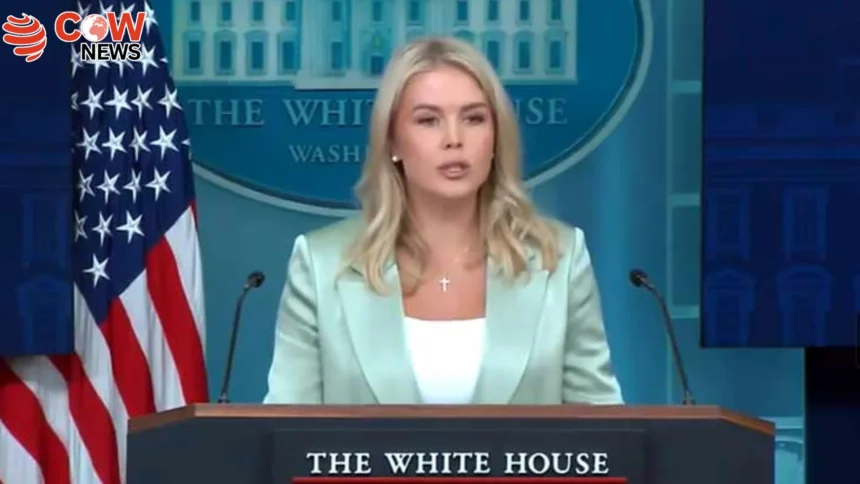WASHINGTON/DOHA ( The COW News Digital) A recent claim by the White House that the United States warned Qatari officials ahead of an Israeli airstrike in Doha has been officially denied by the Qatari government, escalating tensions over the incident. The US Warned Qatar of Israeli Strike.
In light of recent events, it is crucial to understand why the US Warned Qatar of Israeli Strike.
This incident has raised questions about the US Warned Qatar of Israeli Strike, and what this means for future diplomacy.
ss=”rank-math-highlight” style=”background-color: #fee894″>ss=”rank-math-highlight” style=”background-color: #fee894″>In the context of Middle Eastern geopolitics, the relationship between the United States and Qatar has been pivotal. Qatar serves as a strategic ally in the region, hosting the largest U.S. military base in the Middle East, Al Udeid Air Base. This base plays a crucial role in U.S. operations across the region, highlighting the intricacies of military and diplomatic relations. The recent Israeli airstrike incident underscores the delicate balance that must be maintained in such alliances, where communication is key to preventing misunderstandings and potential escalations.
The US Warned Qatar of Israeli Strike, which has led to heightened tensions in the region.
This situation underscores why the US Warned Qatar of Israeli Strike is significant for regional stability.
ss=”rank-math-highlight” style=”background-color: #fee894″>Analysts are considering the implications of the US Warned Qatar of Israeli Strike on future U.S.-Qatar relations.
The diplomatic discourse surrounding the US Warned Qatar of Israeli Strike is vital to understanding the dynamics in the Gulf.
Given these developments, the US Warned Qatar of Israeli Strike may reshape how both nations approach military engagements.
This is a pivotal moment as the US Warned Qatar of Israeli Strike could influence peace negotiations in the region.
In examining the situation, it is clear that the US Warned Qatar of Israeli Strike must be taken seriously by all stakeholders.
The implications of the US Warned Qatar of Israeli Strike extend beyond immediate military concerns.
As reports unfold, the narrative surrounding the US Warned Qatar of Israeli Strike continues to develop.
This nuanced situation highlights why the US Warned Qatar of Israeli Strike is a matter of international concern.
As time goes on, the US Warned Qatar of Israeli Strike will be critical in reassessing military strategies.
Ultimately, the US Warned Qatar of Israeli Strike emphasizes the need for diplomatic engagement and conflict resolution.
As countries analyze the aftermath, the US Warned Qatar of Israeli Strike remains a focal point of discussion.
In summary, the US Warned Qatar of Israeli Strike has significant implications for regional security and diplomacy.
The awareness of how the US Warned Qatar of Israeli Strike will unfold is crucial for global observers.
US Warned Qatar of Israeli Strike: Implications and Reactions
ss=”rank-math-highlight” style=”background-color: #fee894″>ss=”rank-math-highlight” style=”background-color: #fee894″>The airstrike targeting Hamas raises significant concerns about the ongoing conflict in Gaza, where tensions have been exacerbated by years of strife and violence. Hamas, recognized as a terrorist organization by the U.S. and several other countries, has been involved in numerous violent confrontations with Israel. The implications of this airstrike are profound, not only for those directly affected in Gaza but also for the broader political landscape in the Middle East. Scholars and political analysts argue that actions such as these can lead to severe repercussions, including increased hostility towards the U.S. and its allies in the region.
Furthermore, the role of the U.S. in Middle Eastern conflicts often involves navigating complex relationships with various factions. The Trump administration’s approach has been marked by attempts to mediate between conflicting parties while simultaneously supporting Israel’s right to defend itself. This duality presents challenges, as any perceived favoritism towards Israel can alienate Arab nations and hinder diplomatic efforts for peace. The statement from the White House reflects an ongoing commitment to counterterrorism, but it also raises questions about the impact of such statements on U.S.-Arab relations.
In addition to the immediate humanitarian consequences, the strategic implications of the airstrike cannot be overlooked. The death of key figures within Hamas could potentially destabilize the organization, leading to a power vacuum that might be filled by more radical groups. This scenario raises alarms among analysts who warn that increased violence could ensue, further complicating peace negotiations. The United States must tread carefully, as its actions can reverberate through the region and affect global perceptions of its role and intentions.
ss=”rank-math-highlight” style=”background-color: #fee894″>Moreover, the diplomatic fallout from such incidents can strain relationships not only with Qatar but also with other Gulf states. As Qatar continues to assert its sovereignty, the impact of U.S. military actions on its territory becomes a topic of critical discussion. The Qatari government’s response showcases a desire to maintain its independence in foreign affairs, prioritizing its national security and diplomatic integrity. Such positions are essential for Qatar as it navigates its place in a rapidly changing geopolitical landscape.
International observers have noted the significance of Qatar’s stance in this situation, especially given its unique position as a mediator in various conflicts. Qatar’s involvement in talks with Hamas and its role in facilitating dialogue between rival factions illustrate the complexity of its diplomatic strategy. This incident could potentially impact Qatar’s reputation as a neutral party in the eyes of other nations, prompting a reevaluation of its diplomatic engagements.
ss=”rank-math-highlight” style=”background-color: #fee894″>ss=”rank-math-highlight” style=”background-color: #fee894″>As the U.S. reassesses its role in the region, the importance of transparent communication with allies like Qatar becomes increasingly evident. The ongoing investigations into the airstrike and the subsequent diplomatic responses will help shape future interactions between the U.S. and Qatar. By fostering open dialogues, both countries can work towards mitigating the risk of future incidents and enhancing their strategic partnership.
In conclusion, the incident where the US Warned Qatar of Israeli Strike highlights the intricate web of relationships in the Middle East. It emphasizes the need for effective communication and understanding between nations. As the situation evolves, the impacts of such airstrikes will continue to reverberate throughout the region, influencing not only local politics but also international relations.
Ultimately, the airstrike incident serves as a reminder of the fragile nature of peace in the Middle East. With tensions running high and numerous factions vying for power, the path forward will require careful navigation and a commitment to diplomacy. The international community must remain vigilant and supportive of efforts aimed at fostering peace and stability in the region. The complexities of these situations underscore the necessity for allies to work collaboratively, ensuring that messages are clearly communicated and that actions are carefully considered.
Earlier reports stated that the U.S. informed Qatar of the airstrike targeting Hamas’ office in Doha, where senior leadership was reportedly present. According to the White House statement, the notification was intended to prevent civilian casualties in a sovereign ally’s territory while supporting counterterrorism objectives.
The statement explained that President Trump had instructed his special envoy, Steve Witkoff, to communicate the potential strike to Qatari authorities. The White House emphasized that Israel’s target was Hamas, a key objective, and regretted any collateral damage caused during the operation. President Trump also expressed concern for the safety of civilians and called for the prompt release of hostages and the remains of the deceased in Gaza.
Following the airstrike, reports confirmed six fatalities, including the son of senior Hamas leader Khalil al-Hayya. President Trump spoke with both Israeli Prime Minister Benjamin Netanyahu and Qatari leadership, expressing hope that the incident could pave the way for renewed peace efforts. Trump also reassured Qatar that measures would be taken to prevent such incidents on its territory in the future.
However, Qatar’s Ministry of Foreign Affairs, through spokesperson Majid Al-Ansari, categorically denied receiving any prior warning about the attack. Al-Ansari clarified that any communication from U.S. officials occurred during the explosion and not before, refuting the claim that Qatar had been forewarned.
This discrepancy between U.S. and Qatari accounts has drawn international attention, raising questions about communication protocols and the role of allies in conflict zones. Analysts note that such conflicting narratives can exacerbate diplomatic tensions, particularly in sensitive regions like the Middle East, where incidents have far-reaching security and political implications.
The U.S. statement underscored its commitment to cooperating with Qatar and maintaining strategic alliances, while Qatar’s denial reinforces the country’s sovereignty and the importance of accurate reporting regarding military actions within its borders.
As investigations continue, the focus remains on ensuring civilian safety, accountability for the strike, and the broader implications for ongoing peace efforts in Gaza and the surrounding region







